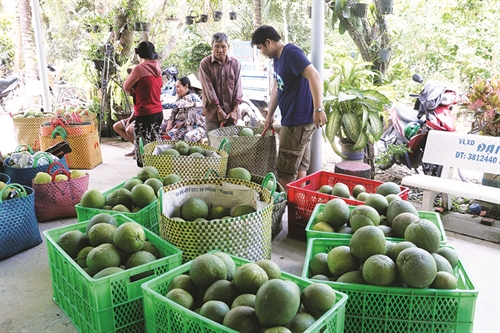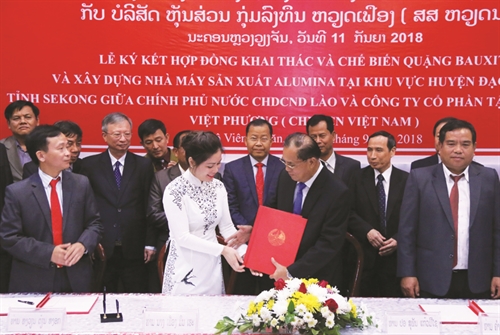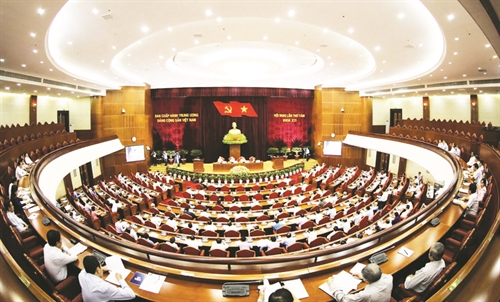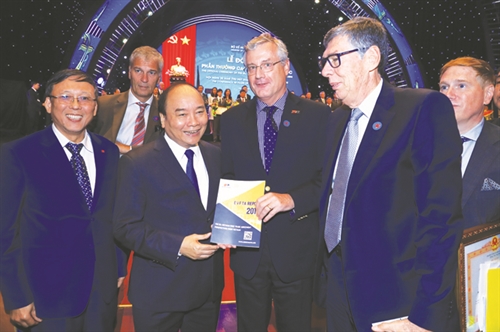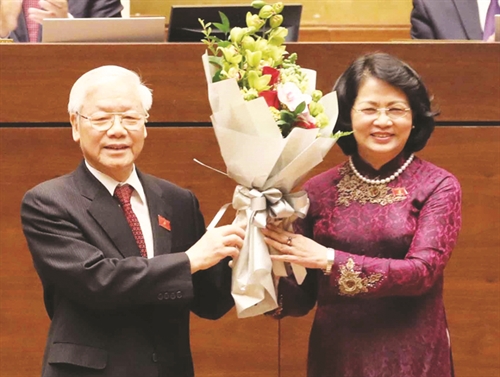This article presents a snapshot of key findings from the 2018 Vietnam Provincial Governance and Public Administration Performance Index (PAPI) research project.[1] The 2018 PAPI Report provides data and analysis about the country’s performance in governance and public administration, as drawn from citizens’ direct interactions and experiences with local governments at different levels in 2018.
Edmund J. Malesky, Dang Hoang Giang,
Paul J. Schuler and Do Thanh Huyen[2]
This article presents findings from the eighth edition of the annual nationwide survey of the Vietnam Provincial Governance and Public Administration Performance Index (PAPI) - a quantitative measurement tool that offers a comprehensive picture of how central and provincial governments have performed on an annual basis. It also marks the 10th year of the PAPI initiative since its introduction in 2009. The 2018 PAPI Report captures experiences and perceptions related to the performance of local governments in governance and public administration in 2018 based on a survey of 14,304 citizens with different demographic characteristics, randomly selected from all 63 provinces and centrally run cities in Vietnam. It also sums up the statements of 117,363 citizens who have participated in rigorous face-to-face surveys since 2009 to share their experiences and assessments of the performance by the state apparatus from the central to commune levels.
Over the years, PAPI has provided data and evidence that reflect six core dimensions (areas) of government performance: (i) participation in elections and policymaking at the local level, (ii) transparency in decision-making, (iii) vertical accountability, (iv) control of corruption in the public sector, (v) public administrative procedures, and (vi) public service delivery. PAPI adapts in response to policy changes and reforms, providing updated reviews of government performance that match citizens’ needs and expectations in these dimensions. As a result, each of the dimensions was refined in 2018, with some old indicators removed and some new indicators introduced to reflect policy changes. Furthermore, as Vietnam develops, new governance challenges have emerged, such as the need for environmental protection and the implementation of e-governance (using information and communication technology for delivering government services). Therefore, from 2018 onward PAPI includes two new dimensions: (vii) environmental governance, and (viii) e-governance. These two dimensions focus on emerging areas of governance and public administration, and emphasize the participatory nature of governance, one that involves citizens at large (in addition to the State or other providers of public services). This includes citizen participation in every process of decision-making to protect the environment as a public good, and to develop e-government tools that utilize public resources for public use.
This article summarizes what national and provincial governments have done to improve their performance in governance and public administration in 2018 and provides suggestions about how they can better serve their citizens over time.
Overview of governance and public administration performance in 2018 and from 2011 to 2018
As Vietnam develops, a wide range of new governance challenges in areas such as environmental protection and e-governance have emerged. Although these new challenges require new solutions, other long-standing issues persist. Anti-corruption efforts, public service delivery, administrative procedures simplification, transparency, and government responsiveness remain as important as ever. In short, governance and public administration challenges in Vietnam exhibit both continuity and change. These evolving trends create challenges and opportunities for PAPI, which must be flexible and adapt to new conditions. At the same time, to provide insights about improvements over time, the index must provide continuity. The section, therefore, provides information and analysis about both longer-term trends and emerging dimensions of governance. Figure 1 below illustrates the trend from 2011 to 2018.
Figure 1: National trends from 2011 to 2018 in the core PAPI
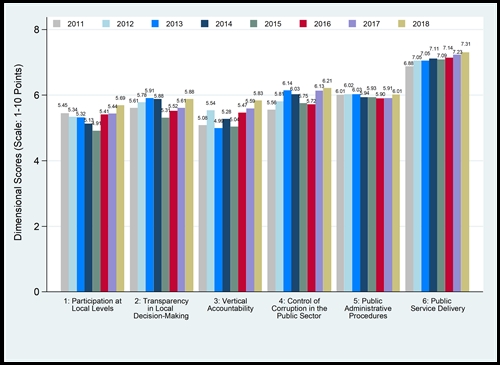 |
Continued positive trends in the performance of governments in the third year of the 2016-21 term. Results for the “Core PAPI” show that there was improvement, although at different rates, in all of these six dimensions in 2018. Three of the dimensions - Participation at Local Levels, Transparency, and Vertical Accountability - showed significant progress, while the other three - Control of Corruption in the Public Sector, Public Administrative Procedures, and Public Service Delivery - exhibited steady improvement.
Coerced participation in local projects decreased. The most significant improvement over time in the Core PAPI dimension of Participation at Local Levels involves decreased use of pressure to force citizens to contribute to local projects either financially, in kind or with their labor. Findings from the report show that there has been a consistent decrease in the number of citizens reporting that they were forced by local officials to contribute to a project; about 50 percent of those contributing said they did so voluntarily in 2017 and 2018, up from an average of about 45 percent prior to 2017. This suggests that citizens have more freedom to decide if they wish to contribute to local projects.
Progress in transparency of poverty lists and commune budgets and expenditures, but not in transparency in land use plans. What stands out for the Transparency in Local Decision-Making dimension (which includes the three core sub-dimensions of transparency in poverty lists, transparency in commune budgets and expenditures, and transparency in land use plans and price frames) is that there was a higher level of citizen satisfaction with transparency in how poverty lists were formulated in 2018, and in transparency of commune budgets and expenditures. However, transparency in land use plans remains an important issue for local governments to improve. One critical but pertaining issue with transparency in land use plans is that over time, less than one-fourth of the population was able to access information about local land use plans and less than one-third had opportunities to provide comments.
More direct interactions between citizens and local government officials. The third dimension, Vertical Accountability, underwent the most change in 2018. Only one sub-dimension - Interaction with Local Authorities - remains constant. Findings from this sub-dimension shows that more citizens reported that they had interactions with village leaders and commune officials in 2018 than in 2017.
Less corruption in the provision of health care and education services, but constant levels of bribery in state employment, use of public funds, and land titling. Key findings from the Control of Corruption in the Public Sector dimension, which remains constant over time, show that citizens were less likely to observe corruption in provision of health care and education services, and in hiring for local government positions. The data also indicate that the percentage of respondents agreeing or somewhat agreeing with the statement that they had to pay a bribe in 2018 for state employment, public health care services, primary education, or construction permits maintained its decline since 2017. However, concerns about bribery for land use rights certificates (LURCs) and public officials’ diversion of public funds remained constant over the two years.
A greater decrease in corruption at the commune level than at higher levels of government as perceived by citizens. While citizens across all groups were more likely to say that corruption had decreased than increased, there are large differences by administrative level. While nearly 60 percent of citizens said that corruption at the commune level had decreased in the past three years, the proportion dropped to less than 50 percent when citizens responded to the same question about corruption at the national level. Also, corruption emerged as one of the top three issues of greatest concern in 2018.
Noticeable improvements in land titling services. Quality of services related to Public Administrative Procedures is another dimension that PAPI has tracked since 2011. Findings from this dimension reflect slight improvements in 2018, particularly regarding the administrative services for LURCs. This, combined with some improvement in land transparency, suggests that while much work remains to be done to enhance land governance performance, noticeable gains have been made.
Performance improved in provision of basic public services, except primary education. The sixth core PAPI dimension - Public Service Delivery - reveals a significant divergence between different basic services. The Public Health sub-dimension, for example, saw continued improvement in 2018, largely thanks to the increased number of respondents accessing health insurance; the rate rose from 80 percent in 2017 to 87 percent in 2018. Scores in the Basic Infrastructure sub-dimension, which includes garbage collection, road quality, electrification, and drinking water quality, also improved dramatically in 2018. Compared to the other public services, public primary education saw some decline, which was mainly due to lower satisfaction with the quality of primary schools and of primary education.
More concerns about water quality than air quality, with citizens showing strong support overall for environmental protection. Concrete findings from the new Environmental Governance dimension suggest that more citizens were concerned about water quality than air quality in 2018 compared to prior years. More than half of the respondents said water quality had worsened in the past three years, while about 36 percent said air quality had declined over the same period. Also, the percentage of respondents preferring environmental protection to economic development at all costs increased from 69 percent in 2016 to 74 percent in 2018.
A large gap between the number of citizens using the Internet and those accessing e-government portals. Findings from the new E-Governance dimension show that the percentage of respondents who access news on the Internet surged from 28 percent in 2017 to 38 percent in 2018. Fifty-three percent of respondents said they had Internet access at home, an increase of more than 15 percent from 2017. However, the percentages of respondents using government e-portals for administrative procedures and services remained extremely low, ranging from about 1 percent (for construction permit procedures) to 4 percent (for certification procedures), although some increase could be seen from the 2017 figures.
Overall, despite progress in some areas, significant room for improvement remains. As findings from the six Core PAPI dimensions show, governance and public administration performance in 2018 improved across a wide range of aspects, while challenges remain in important areas such as voluntary participation, land transparency, corruption in state employment, land use rights certification and public primary education. Similarly, findings from the new dimensions of Environmental Governance and E-Governance show that there are opportunities for increased efforts in these areas. Because air, water and environmental pollutants are both endogenous and heterogeneous in nature, provincial governments can partner with neighboring provinces to find common solutions besides simply implementing local measures to prevent environmental pollution in their provinces. Lastly, the more citizens receive access to the Internet, the higher their expectations are for strengthened e-governance and better access to online facilities for administrative procedures to reduce transaction costs, including informal costs.
Issues of greatest concern in 2018 from the perspective of citizens
This section provides findings about issues of great importance for Vietnamese citizens and the Government. While noting that the sharpest increases in 2018 compared to previous years were in concerns about corruption, economic growth, law and order, and education, this section briefs findings from the 2018 PAPI survey about economic inequality, environmental trade-offs and gender equality, to better understand citizens’ expectations for the State in these areas, as illustrated in Figure 2.
Figure 2: Most important issues facing the country from citizens’ perspective, 2018
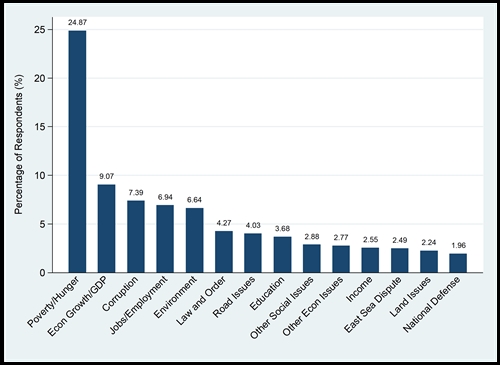 |
Poverty - the greatest concern in 2018. While Vietnam’s economic growth rate in 2018 was reported to reach 7 percent, respondents continued to cite poverty and hunger as the top two matters requiring additional efforts by the State. Poverty ranked first in the list of issues of greatest concern for the fourth year in a row (since 2015). Fears about falling back into poverty and concerns about the impact of poverty on overall national development were still the key drivers behind the continued importance of poverty reduction. Deeper analysis shows that income inequality was the key economic driver for poverty concerns. In terms of solutions, wealthier respondents are more likely to support paying taxes for redistribution of resources to poorer provinces.
Strong preference for environmental protection, “clean” investors and greener energy. In-depth analysis in this report shows that negative environmental impacts have a consistent effect on respondents’ preferences for environmental protection across different societal groups. In general, Vietnamese citizens were willing to contribute to improved environmental conditions. Citizens also prefer environmentally “clean” investors over those that contribute comparatively more to job growth and local tax revenues but less to protecting the environment. In terms of being willing to pay for greener energy, reduced local air pollution and the ability to improve power generation were more important factors in citizens’ support than mitigating climate change. Overall, the findings in this area suggest that environmental issues are critically important for Vietnamese citizens of all types.
No strong preference regarding which gender should be in leadership roles, although some, especially women, showed biases toward men. As gender equality is a high priority in Vietnam’s sustainable development agenda, the 2018 report examines public views regarding gender and leadership positions. Findings from the research show that a majority of voters have no preference for either male or female candidates. Among the minority who do have a preference, more are likely to prefer men than women. This bias is most pronounced for political leadership positions and, interestingly, is most pronounced among women.
Provincial performance in 2018
The final session provides an overview of provincial performance in eight dimensions of governance and public administration. Of these dimensions, the six conventional (core) ones are Participation at Local Levels, Transparency in Local Decision-Making, Vertical Accountability, Control of Corruption in the Public Sector, Public Administrative Procedures, and Public Service Delivery, and two new dimensions are Environmental Governance and E-Governance.
Findings from the 2018 PAPI survey indicate that provincial governments need to do a lot more to satisfy their citizens’ expectations. There remains a significant disparity between the highest aggregated provincial score of 47.05 points and the potential maximum aggregated score of 80 points (on the scale of 10-80 points for all eight dimensions). This gap suggests that opportunities exist for further reforms and better implementation of policy by local governments as they strive to be more open, transparent, accountable, and responsive, and to act with integrity.
Dimensional results also show that each province has its own strengths and weaknesses; none of the 63 provinces and cities excelled in all eight dimensions. For instance, Lang Son and Bac Giang were in the best performing groups in six out of the eight dimensions. Still, Bac Giang remained in the low-average performing group for the Vertical Accountability dimension. This suggests that no solution is best for all provinces; local governments need to review each indicator to understand where they have performed well and where they need to improve, and then identify relevant solutions for each policy area included in PAPI.
Interestingly, regional patterns have been consistent over time in some dimensions, despite the changes made to the index in 2018. Northern provinces tend to do better in the areas of Participation at Local Levels, Transparency in Local Decision-Making, and Vertical Accountability compared to southern provinces. On the contrary, more southern provinces perform better in the Control of Corruption in the Public Sector dimension. However, in the two new dimensions, northern provinces tended to perform better in E-Governance but do more poorly in Environmental Governance than their southern peers. Regional differences may suggest areas of focus for government agencies in charge of regional development, such as encouraging provinces within each region to focus on weak areas and/or to exchange information or experiences with provinces in other regions.
The PAPI findings have contributed to a variety of impacts over the years, and greater impacts are expected in the future at the provincial level. All 63 provinces and cities have hosted local PAPI diagnostic workshops, and all of them have issued action plans, directives, official letters or resolutions to request that local government agencies respond to the citizen feedback generated by PAPI. In 2018 alone, at least 38 provinces issued new or renewed provincial responses with a one-year or three-year perspective, aiming at attaining higher citizen satisfaction with their performance. Box 1 below introduces efforts by Dong Nai province in improving local government’s performance to serve citizens better. These provincial efforts are encouraging while it is important to note that citizens will expect for more as Vietnam develops to become a middle-income country.
Box 1: Timeline of Dong Nai’s responses to PAPI findings
| 2010 - 2013 | PAPI not mentioned in any public communication of the province |
| March 20, 2014 | Report capturing Provincial Competitiveness Index (PCI) and PAPI findings submitted to the Chairperson of the Provincial People’s Committee by the Department of Home Affairs to call for actions in response to poor performance as reported by citizens in the province. |
| May 26, 2016 | Provincial leaders met to discuss ways to improve performance, thus gaining higher PAPI, PCI and Public Administration Reform (PAR) Index scores. |
| July 13, 2017 | Dong Nai convened the first ever PAPI diagnostic workshop, with UNDP providing analysis of the 2016 PAPI findings for the province and Ho Chi Minh National Academy of Politics (HCMA) sharing experiences of other provinces. During this period, Dong Nai was calling for innovative ideas from businesses and the public on how to further reform administrative procedures. |
| July 24, 2017 | The Dong Nai Provincial People’s Committee issued Directive No. 7213/UB-HC on implementation of measures to improve provincial and public administration performance, in order to achieve higher PAPI scores. Provincial and district agencies followed up with their sectoral and local action plans to roll out the measures. See the action plan by the Department of Science and Technology, dated August 15, 2017, as an example. |
| August 6, 2017 | Dong Nai convened its advisory meeting to hear from UNDP and HCMA on how to improve their performance from commune to provincial levels. At the meeting, Dong Nai provincial leaders requested heads of agencies in the province to hear and act upon citizen feedback to improve their performance. |
| April 4, 2018 | Dong Nai provincial leaders attended the launch of the 2017 PAPI Report and reported immediately to citizens about how the province performed in 2017 via the province’s own public administration reform website. |
| September 17, 2018 | Dong Nai Province launched its first-ever real-time surveys to obtain citizen feedback, based on the PAPI model. The surveys, which asked about the quality and performance of one-stop shops from provincial to commune levels, were developed with substantive advice from UNDP and assistance from Real-Time Analytics, a PAPI partner. |
| September - December 2018 | Dong Nai kept track of the findings from its real-time survey tool, and informed the public about how the PAPI-like survey on one-stop shop performance works. |
| December 28, 2018 | Dong Nai launched the 2018 Report No. 14443/BC-UBND on citizens’ satisfaction with administrative services from provincial to commune levels. |
Conclusions and implications
Despite rapid declines in poverty and improvements in economic conditions, many Vietnamese - particularly those in lower income strata - remain concerned about poverty and the environment. The option of taxation for redistribution to poorer areas tends to receive a high level of support among the wealthier and more educated respondents. With 90 percent of the population earning less than VND 20 million (equivalent to USD 862) per person per month, and a much smaller group of wealthier people, policy on tax-based redistribution should be well-articulated and well-designed so as not to upset low-income earners.
Findings on environmental trade-offs also hint at the need for continued difficult juggling acts by the Government: Citizens consistently prioritize environmental protection, even at the expense of economic growth. The desire for a secure power supply amidst the quest for cleaner energy to replace coal power plants poses another development challenge. This suggests that any decision-making processes for new investment projects and energy development need to incorporate deliberative consultation with the public to ensure that citizens’ opinions regarding the trade-offs are fully and openly considered, and to avoid potential conflicts when the projects are carried out.
On the issue of gender equality, while some progress has been made toward equal rights to LURCs, much work remains to increase equal opportunities for both women and men in leadership positions. While the 2018 data show that a majority of citizens do not have a gender preference when electing candidates to political leadership positions, a substantial minority express a preference for male candidates, and the greatest bias appears to be among female rather than male respondents. These findings highlight a great opportunity for more women to be elected to political positions, while also suggesting that more work needs to be done to end societal stigma against women, especially among female voters.
Local governments should pay attention to each of the PAPI indicators when seeking ways to respond to citizens’ rising expectations. As shown in this report, citizens have demanded more opportunities for increased participation in local decision-making; enhanced transparency and accountability; continued efforts to control corruption in the public sector; greater attention paid to managing the environment (the most problematic issue); and improved e-governance so that governments and citizens can interact virtually to obtain basic information about public policy and public services.
Achieving all this requires both holistic and context-based policies and practical measures to help local governments in responding to citizens’ desires for more participatory and inclusive governance. These measures may include, among others, regular and ad-hoc monitoring of local governments’ performance (by both government and non-government entities), openness and responsiveness to feedback from citizens, and deliberative participatory processes to engage citizens in decision-making and policy implementation. Open government at all levels may be the next reform endeavor to meet the rising demands from Vietnamese citizens.
At the national level, state and government agencies at the central level should also consider what citizens are most concerned about (in addition to paying attention to specific citizen expectations for local government actions, which can inform central-level policy responses). As this report shows, while citizens are very optimistic about the economic situation of the country and their own households, they are (somewhat paradoxically) most concerned about poverty reduction, economic growth, corruption and the environment - all of which call for attention and action by the State.
Delving into the reasons for these views, there are several key conclusions that can be drawn based on the 2018 PAPI survey responses: Citizens are concerned about rising income inequality, about embedded gender disparity within the state apparatus (a majority of citizens support both men and women filling positions of political power), and about systemic large-scale corruption and petty corruption as experienced by citizens. They also have a strong preference for environmental protection and “clean” investment (as opposed to economic growth at all costs). The desire for greater participatory, transparent, accountable, clean, responsive, and environmentally friendly public institutions and policies is clear from citizens’ feedback.
In this context, PAPI acts as a rigorous and objective “open platform,” enabling citizens to benchmark their governments’ performance and advocate for improvement while creating constructive competition and promoting learning among local authorities in different aspects of governance and public administration. With the time series data, the PAPI partners have produced the annual reports providing multidimensional and comparative perspectives for central and local governments to review their performance at both the comprehensive and sector-specific levels. Eventually, PAPI serves as a means of verification for better governance and public administration at the local level and also informs the policy cycle at the central level in Vietnam. The data also provide necessary baselines for Vietnam to review the implementation of the national 2011-20 socio-economic development strategy and the Sustainable Development Goals toward 2030 and to plan for the 2021-30 socio-economic development strategy.-

